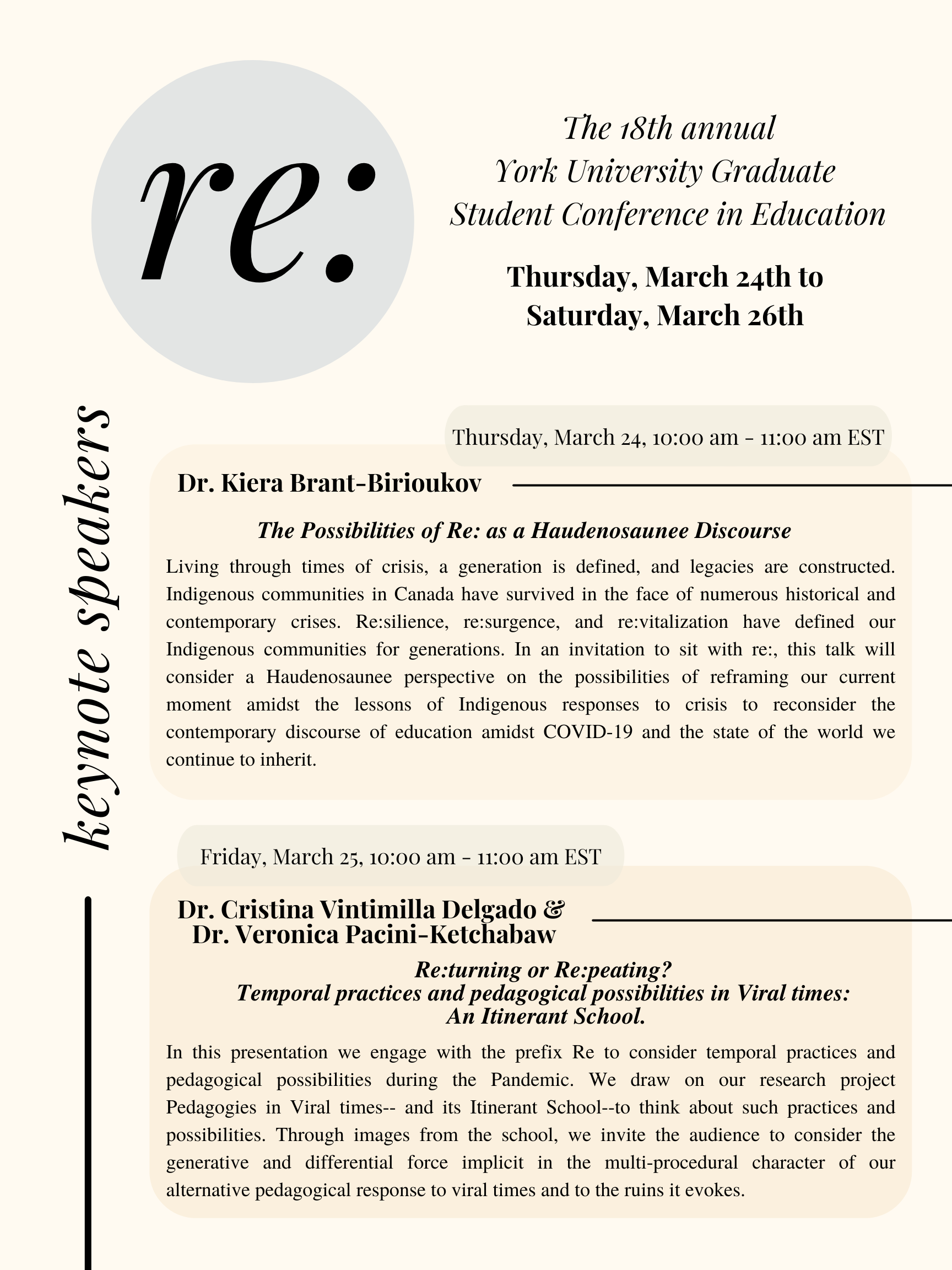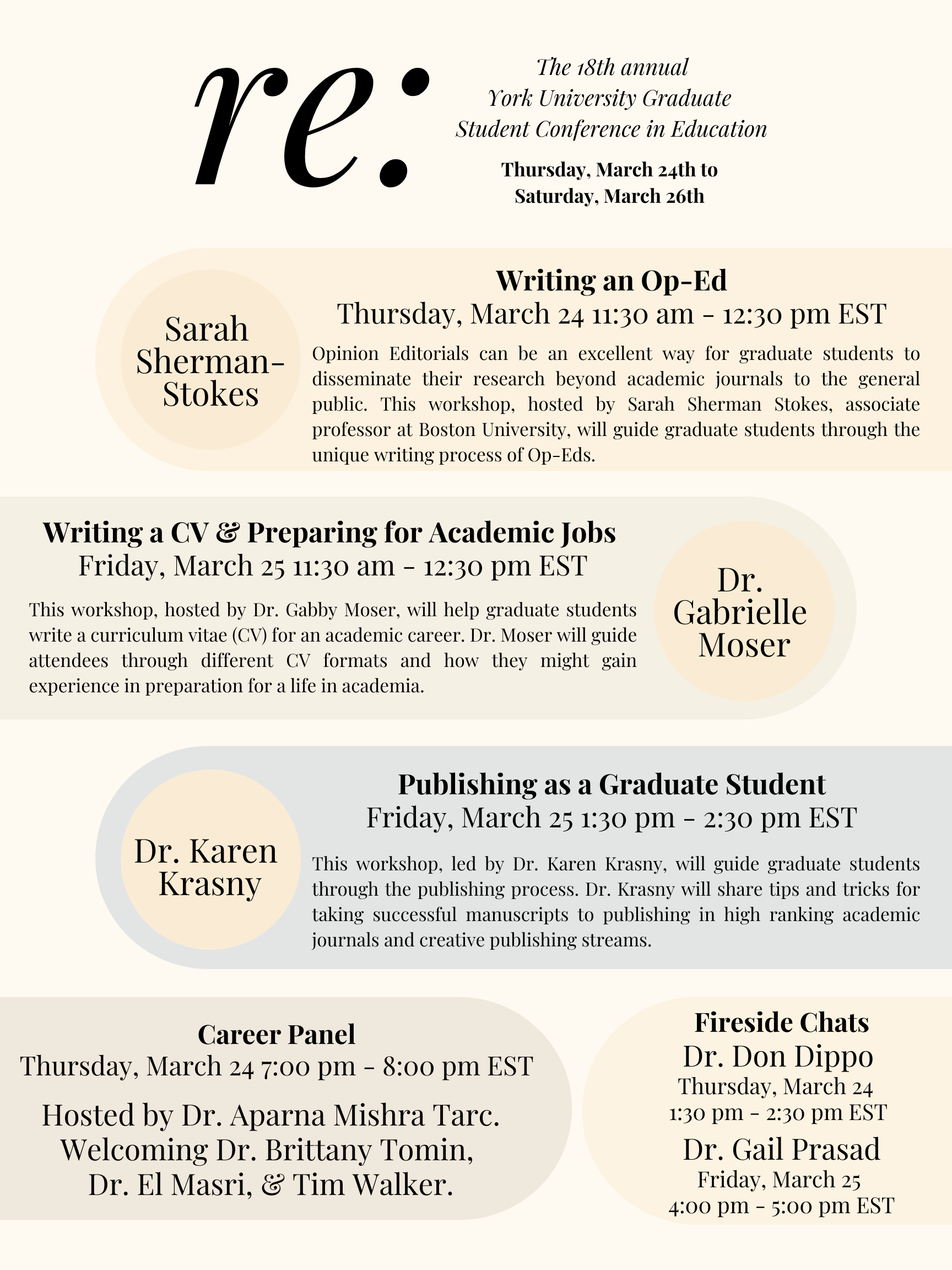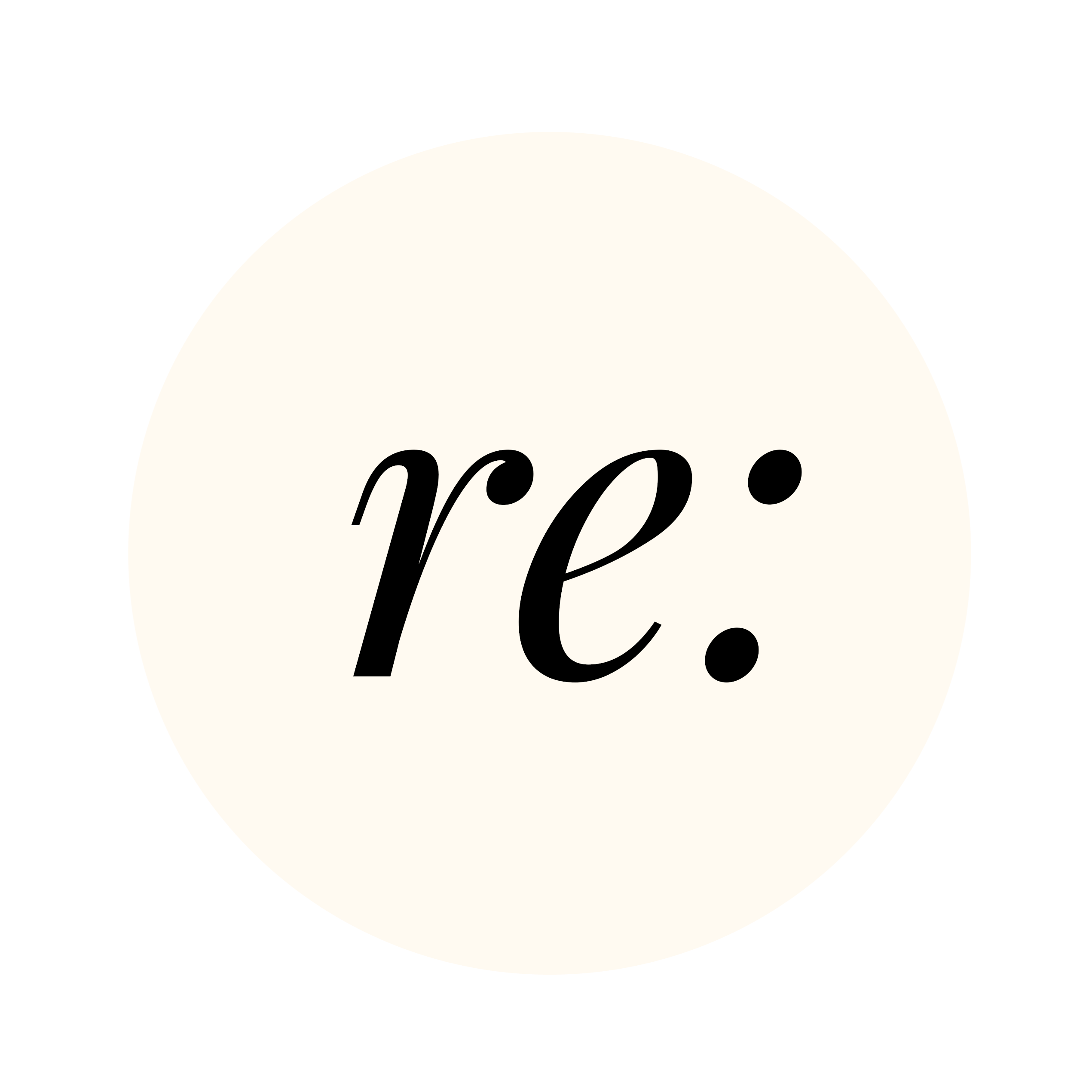The 18th annual York University Graduate Student Conference in Education
March 24th - 26th, 2022*
Registration opens on February 24, 2022
Registration for the conference is now CLOSED!
We—all of us on Terra—live in disturbing times, mixed-up times, troubling and turbid times. The task is to become capable, with each other in all of our bumptious kinds, of response. Mixed-up times are overflowing with both pain and joy—with vastly unjust patterns of pain and joy, with unnecessary killing of ongoingness but also with necessary resurgence. [...] Our task is to make trouble, to stir up potent response to devastating events, as well as to settle troubled waters and rebuild quiet places. [...] In fact, staying with the trouble requires learning to be truly present, not as a vanishing pivot between awful or edenic pasts and apocalyptic or salvific futures, but as mortal critters entwined in myriad unfinished configurations of places, times, matters, meanings. (Haraway, 2016, p.1)
We need to ruin what ruins. (Ahmed, 2017, p. 40)
To build from the ruin, our building might seem ruined; when we build, we ruin (Ahmed, 2017, p. 232).
The pandemic has left a mark on all of us in disproportionate ways. The prospect of re:opening from the pandemic, with all of its assumptions, complexities and uncertainties, has caused us to pause and consider what re:opening actually means. We offer the prefix re:, meaning both “again” and “back” (Oxford University Press, 2021), as a way to consider our relations with/in histories and futures. The : after re intensifies this relationality by “amplifying what has come before it” (histories) and “directing us to the information following it” (futures) (Grammarly, 2021). The preposition re:, meaning “in the matter of,” “concerning” (Oxford University Press, 2021) draws us to the urgency of what matters and what concerns us in the now. Thus, we conceptualize re: as a liminal space/time between pasts and futures, a bumpy space where disaggregated research practices, theoretical frameworks and methodologies meet, resist and transform. Taking the preposition re: as a proposition, we engage Donna Haraway’s provocation to stay with the trouble of what concerns us and of what matters in conversation with Sara Ahmed’s incitement to build and ruin from/with/in this liminal space/time of re:.
What does it mean then to re:open from a pandemic, “to build from the ruin” (Ahmed, 2017)? What histories are entangled with our futures, what do we ruin when we build? What risks do we take and what vulnerabilities do we expose? How do we work in situated ways that do not erase histories or smooth out futures? How do we “ruin what ruins”?
As we move toward what is being called a re:opening, we ask the question - as re:searchers, educators, thinkers, scholars, storytellers, makers, and creators - what is our re:spons-ability to come together in a conference space? We invite you to think with re: as an intersection of histories and a re:membering of ethical orientations toward futurities and how this brings us to our current dwellings in this liminal space/ time of re:.
re: calls us to situate our work in the ruins, thinking with and through the following questions:
- What does it mean to re:engage in a world that is built on foundations of
oppression? - How do we re:imagine education (pedagogies, practices, teaching/learning) in the ruins and deliberate ethical possibilities for livable futures?
- How can we re:envision our notions of and relations with “community” in pasts,
presents and otherwise futures?
We are no longer accepting submissions at this time.
Registration is now open! Our program will be posted in early March.
*Please note that this conference will be virtual.

We are pleased to offer five different professional development workshops during our conference this year. All workshops are free to attend. Stay tuned for more information on how to register for these workshops!

Publishing in Academic Journals
Publishing is an important element of graduate school and academic life. This workshop, led by Dr. Karen Krasny, will guide graduate students through the publishing process. Dr. Krasny will share tips and tricks for taking successful manuscripts to publish in high-ranking academic journals and creative publishing streams.
Writing an Op-Ed
This workshop will guide graduate students through the publishing of opinion editorials (Op-Eds). Op-Eds can be an excellent way for graduate students to disseminate their research beyond academic journals and to the general public. Sarah Sherman Stokes, associate professor at Boston University, will explain the genre of Op-Eds and guide graduate students through the unique writing process of these editorials.
Writing a CV
This workshop, hosted by Dr. Gabby Moser, will help graduate students write a curriculum vitae (CV) for an academic career. Dr. Moser will guide attendees through different CV formats and how they might gain experience in preparation for a life in academia.
Career Panel
Two faculty members (senior and junior) and two recent YorkU grads (academic and non-academic) talk about life after graduate school and the diverse career paths students might consider in/out of the field of academia. Aparna Mishra Tarc will chair this panel talk. Questions will be submitted in advance, discussants will respond, then there will be a brief Q & A session at the end.
Fireside Chats
We will have two drop-in sessions where current faculty members from the faculty of education (Don Dippo and Gail Prasad) can connect with students to talk about the grad school experience, being a professor, and other elements of professional life. There will be at least 2 faculty members per scheduled session. This will be an informal session for graduate students to ask questions in a collegial, low-pressure environment.
Grad Conference Meeting Minutes-February 14
Grad Conference Meeting Minutes-February 1
Grad Conference Meeting Minutes-January 20
Grad Conference Meeting Minutes-December 9
Grad Conference Meeting Minutes-December 2


